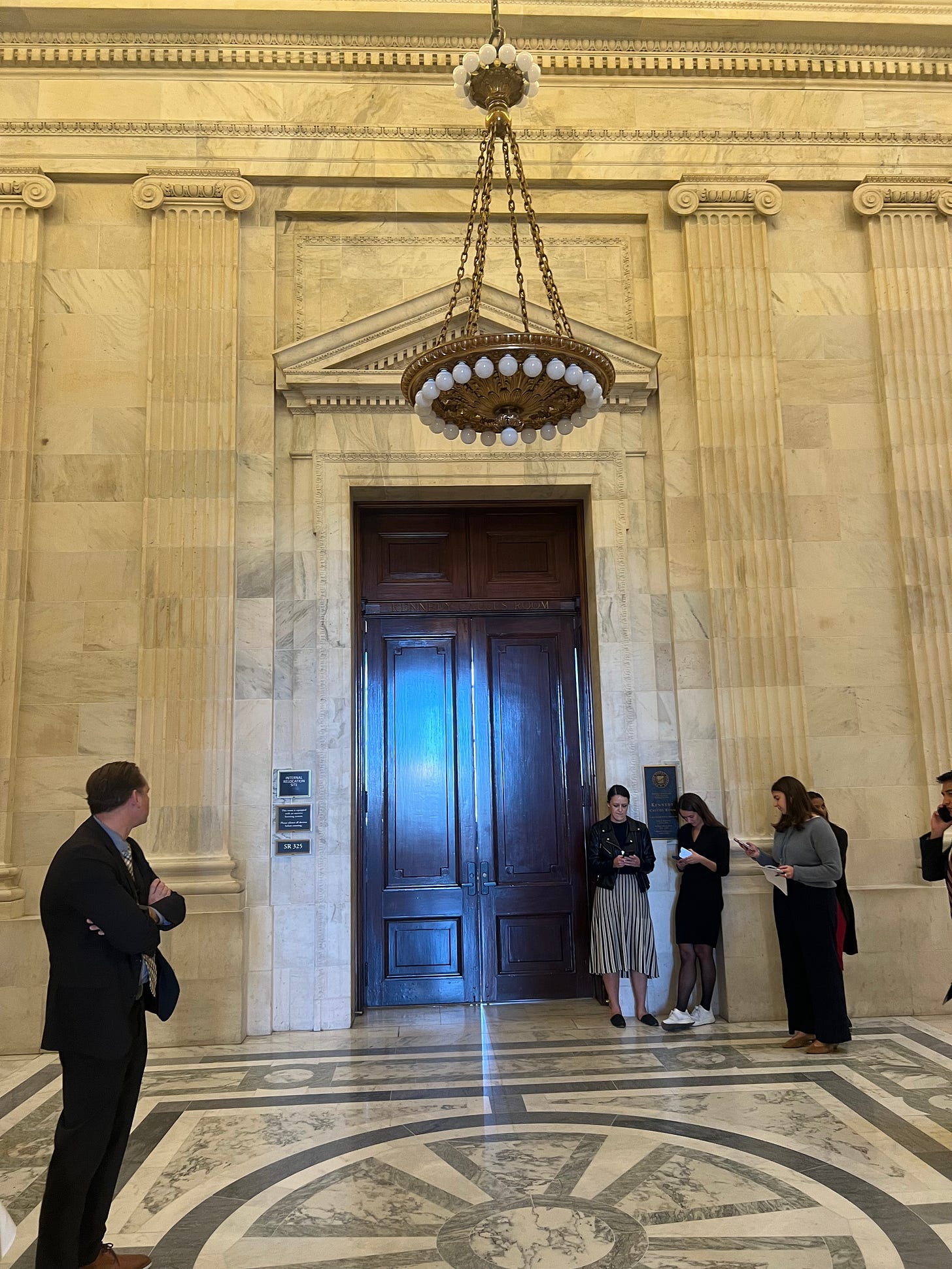How to End Shutdowns Forever
Is this really the best way to govern?

At least once a week — and sometimes more — all the Democratic senators and all the Republican senators gather for two separate lunches at the Capitol.
Those strict party lines were scrambled Thursday, when Sens. Rand Paul (R-KY) and Gary Peters (D-MI) invited the entire chamber for a rare bipartisan lunch in the Kennedy Caucus Room, the cavernous space where both John and Bobby Kennedy announced their presidential runs.
If nothing else had solved the government shutdown, maybe a menu of Kentucky fried chicken and Michigan cherry salad would?
I’m sure it was delicious, but it doesn’t seem to have done the trick. The lunch was scheduled at the same time as three Senate votes, which meant most members only spent a short time at the meal while shuttling back and forth to the chamber.
There was a small glimmer of progress, though it was more about managing the shutdown than ending it: Sen. Ron Johnson (R-WI) emerged at one point to say that a bipartisan compromise is within sight to pay federal workers while the shutdown continues. “I’m actually quite optimistic,” he said. Johnson told me that he believed the House would return to Washington to approve the measure if the Senate passed it.
Senators are trying to shrink the problem. I wanted to see if there was any interest in expanding it. As they walked in and out of the lunch, I canvassed senators to hear their thoughts on something more ambitious: ending government shutdowns forever.
I received a mixed reception: “I wish” that was being discussed, Sen. Katie Britt (R-AL) told me. “I quite hate that idea,” Sen. Brian Schatz (D-HI) said. At least one lawmaker, Sen. Jeanne Shaheen (D-NH), appeared to suggest that shutdowns should be ended — but by the executive, not legislative, branch. “I think we should do it the way we used to, before Jimmy Carter was president,” Shaheen said. (Before a 1981 Carter administration memo created shutdowns, whenever appropriations ran out, the government would merely run things at the previous year’s spending levels. The Trump administration could theoretically rescind the 1981 memo and revive that way of doing things at any time.)
One of my goals in Wake Up To Politics is to look beyond the partisan fights of today and start thinking about ways we can improve our political system long-term. Last month, I wrote about ways to look past the current gerrymandering back-and-forth and more permanently curb partisan redistricting. In this week’s paid-subscriber column: what are ways we could do away with the ritual of government shutdowns?
I’ll walk through some of the best ideas on the table — and also add in a few of my own.
Auto-CRs
Whenever the U.S. is about to hit its debt ceiling, you’ll inevitably hear pundits groaning that nobody else runs their government like this. And it’s true: as I wrote in 2023, the only other country with a fixed debt limit is Denmark, and it’s set so high above their normal debt intake that nobody actually worries about hitting it.
You don’t hear as many complaints like that around government shutdowns — because, frankly, you could argue America’s way of handling its budgets is more functional than its peer countries. (For once!)
In many parliamentary systems, if the government fails to pass a budget, it doesn’t temporarily shut down — it collapses, forcing the need for new elections.1 This might soon happen in Canada, for instance: if Prime Minister Mark Carney can’t scrounge together three extra votes for his budget proposal by November 4, the current sitting of the country’s parliament will dissolve. New elections will be triggered, just six months after the last ones. Not too long ago, Israel went through a period where it held five elections in three years; France, meanwhile, is on its fifth prime minister in two years. Both political crises can be partly traced back to budget disputes.
Can you imagine if America wasn’t just furloughing workers now, but also gearing up for a new national campaign? Sounds much more chaotic.
Still, though, in all those countries, even if the inability to agree on spending leads to snap elections, there are still emergency measures the government can take to access a temporary supply of money in between the expiration of the old budget and the approval of a new one.
Just before the start of the current shutdown — now the second-longest in U.S. history, with no end in sight — the Senate took a little-noticed vote that would have set up something similar here.


